Podcast (tihe_podcast):
Play in new window | Download | Transcript
Subscribe: Apple Podcasts | Spotify | RSS | How do I listen to a podcast?
Robert Bjork on using cognitive psychology to enhance learning.
PODCAST NOTES
Guest:
- Distinguished Professor of Psychology at UCLA
- Learning and memory; the science of learning in the practice of teaching.
- The Bjork Learning and Forgetting Lab
Common misperceptions
Belief that we work something like a man made recording device.
In almost every critical way, we differ from any such device.” – Robert Bjork
How can it be that we have all these years of learning things and formal education and then end up really not understanding the process? You might just think by sheer trial and error during all of our educational experiences we would come to understand ourselves better than we apparently do.” – Robert Bjork
We found all these different situations where the very same thing that produces forgetting then enhances learning if the material is re-studied again. Forgetting is a friend of learning.” – Robert Bjork
The spacing effect
- Delay in re-studying information
The environmental context
- If you study it again, then you're better off to study it in a different place.
- This is counter to the advice to study in a single place.
Retrieval practice
When you recall something, it does far more to reveal that you did indeed have it in your memory.
“Using our memories shapes our memory.”- Robert Bjork
As we use our memories, the things we recall become more recallable. Things in competition with the memories become less recallable.”- Robert Bjork
We should input less and output more.”- Robert Bjork
Test yourself; retrieval practice
Low-stakes or no-stakes testing is key to optimizing learning.”- Robert Bjork
“When I say they become inaccessible, they are absolutely not gone.”- Robert Bjork
Interleaving
“In all those real-world situation where there's several related tasks or components to be learned, the tendency is to provide instruction in a block test. It seems to make sense to work on one thing at a time.”- Robert Bjork
“We are finding that interleaving leads to much better long-term retention. It slows the gain in performance during the training process but, then leads to much better long-term performance.”- Robert Bjork
“Forgetting is not entirely a negative process. There are a number of senses in which forgetting can be a good thing.”- Robert Bjork
“The very same people who just performed better, substantially, with interleaving, almost uniformly said that blocking helped them learn better.”- Robert Bjork
Desirable difficulties
They're difficulties in the sense that they pose challenges (increased frequency of errors) but they're desirable in that they foster the very goals of instruction (long-term retention and transfer of knowledge into new situations).
- Interleaving vs blocking
- Varying the conditions of learning and the examples you provide rather than keeping them constant
- Spacing vs massing (cramming)
“The word desirable is key. There's a lot of ways to make things difficult that are bad.”- Robert Bjork
The generation effect
Any time you can take advantage of what your students already know and give them certain cues so that they produce an answer, rather than you giving them an answer, you greatly enhance their long-term retention.”- Robert Bjork
Incorporating generation is a desirable difficulty but people have to succeed at the generation. If they fail, it is no longer a desirable difficulty.”- Robert Bjork
Errors are a key component of effective learning.”- Robert Bjork
Successful forgetting
- Memory relies on being in the same situation
- Present it in a different context, produces longer-term learning
- Encode the information differently; encoding variability
- Retrieval is powerful, but depends on success to make it so
Many things are involved in remembering people's names.” – Robert Bjork
Self regulated learning
The key is for us all to learn how to learn more effectively.”- Robert Bjork
As a consequence of our complex and rapidly changing world and also changes in technology and educational environments, more and more learning is happening outside any formal classroom setting. It's in our own hands.”
- Across a lifetime
Recommendations
Bonni recommends:
GoCognitive’s Robert Bjork videos on YouTube
Bob recommends:
Several books on research on learning
Closing notes
- Rate/review the show. Please consider rating or leaving a review for the Teaching in Higher Ed podcast on whatever service you use to listen to it on (iTunes, Stitcher, etc.). It is the best way to help others discover the show.
- Give feedback. As always, I welcome suggestions for future topics or guests.
- Subscribe. If you have yet to subscribe to the weekly update, you can receive a single email each week with the show notes (including all the links we talk about on the episode), as well as an article on either teaching or productivity.
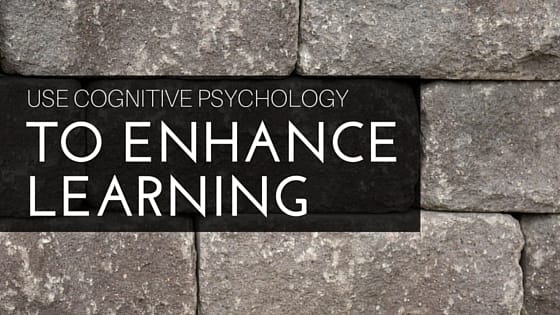
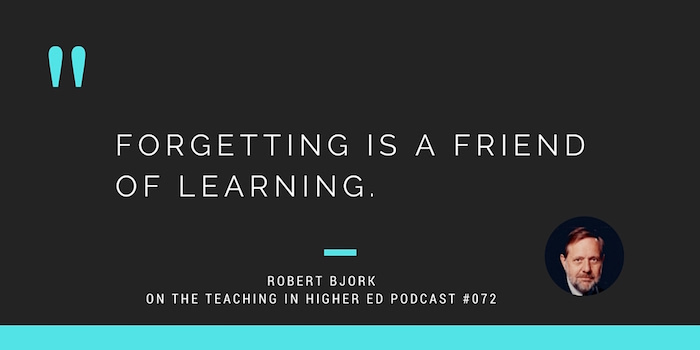
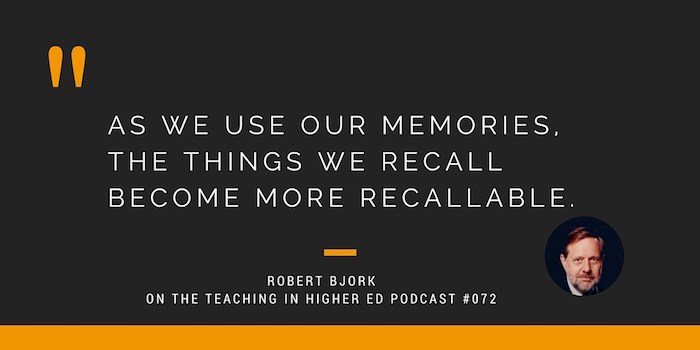
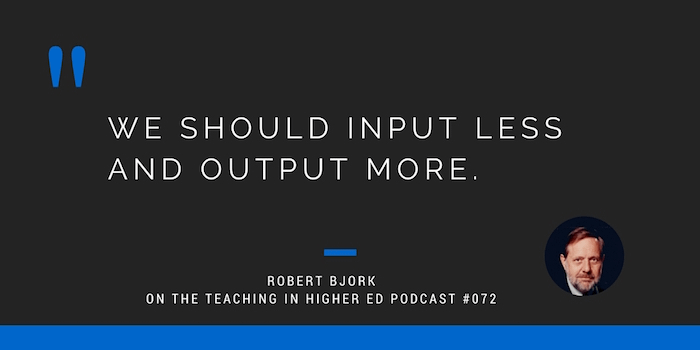
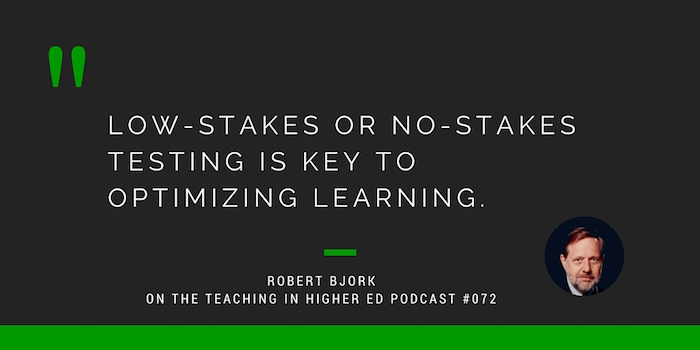
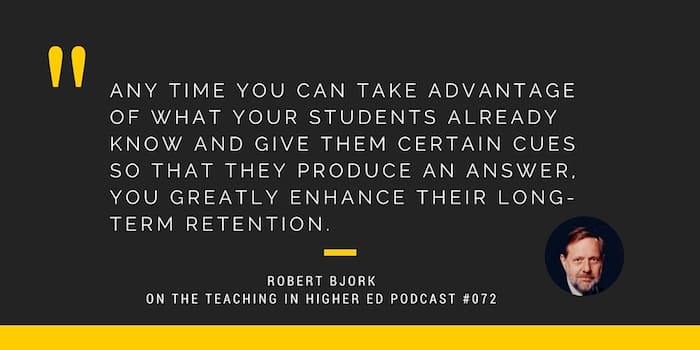
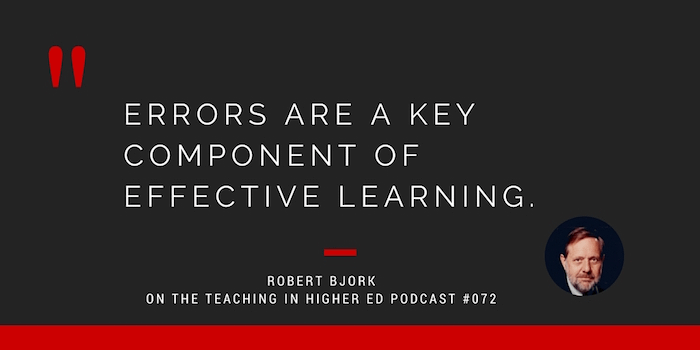
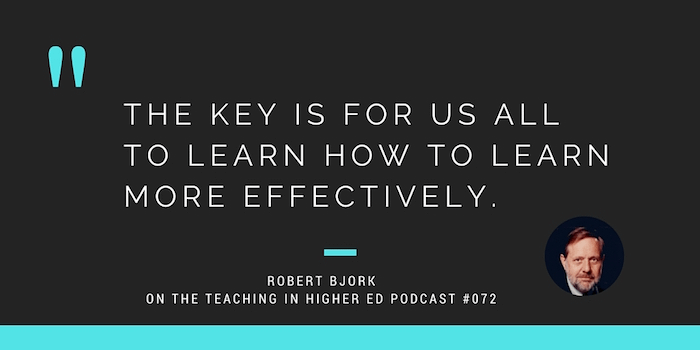


I thoroughly enjoyed this — thanks! I actually took notes of some of the key phrases that really resonated with me. After I finished listening, I then noticed the highlights on this page. My notes almost exactly matched the highlights! Great job all around.
So glad to hear that, Bill.
I just listened. Thanks for the relaying how psychology corrects our faulty intuitions about learning! Prior to this, I assumed that blocking would be better than interleaving. I assumed wrong. 🙂